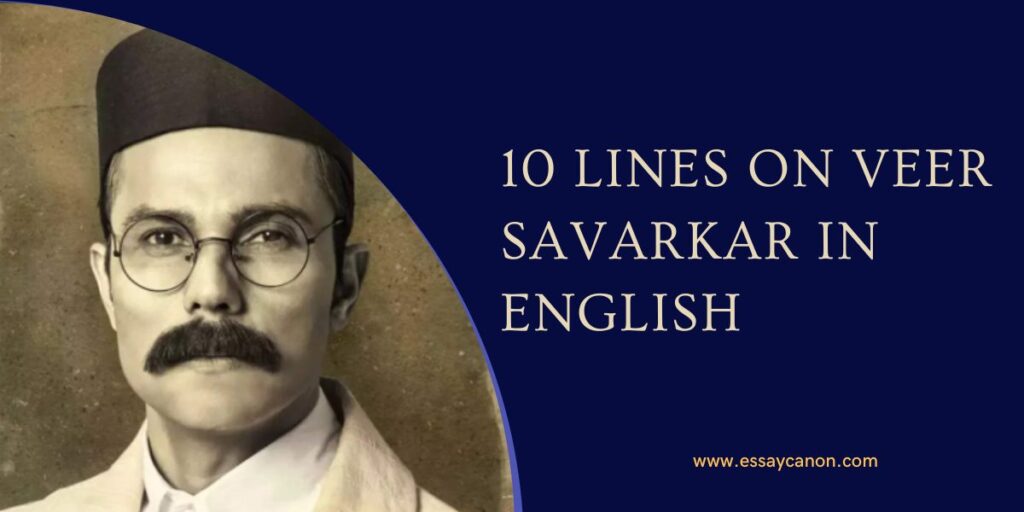Veer Savarkar was famous for his role in the Indian independence movement against British colonial rule. He was a key figure in the movement and advocated for complete Indian independence and self-rule. He was also a prolific writer, playwright, and poet, and his works continue to be widely read and studied today. Here in this article I am going to talk about 10 lines on Veer Savarkar, essay on Veer Savarkar. So check them out one by one.
10 Lines On Veer Savarkar In English

- Vinayak Damodar Savarkar, commonly known as Veer Savarkar, was an Indian freedom fighter, writer, and political leader.
- He was a key figure in the Indian independence movement against British colonial rule.
- Savarkar was a proponent of Hindutva, a term he coined to describe the ideology of Hindu nationalism.
- He was an advocate of complete Indian independence and self-rule, and was critical of the Indian National Congress and its leaders.
- Savarkar was arrested and exiled by the British government for his revolutionary activities, and spent over a decade in prison.
- He wrote several books including “Indian War of Independence” in 1909 and “Hindutva” in 1923
- Savarkar was also a prolific playwright and poet, and his works include the play “Rana Pratap” and the poem “Abhanga.”
- He was also a historian and wrote a biography of the Maratha king Shivaji.
- Savarkar’s ideas and writings continue to be influential in Indian politics and society.
- However, his involvement in the assassination of British colonial official W.H.Curzon Wyllie has been a point of controversy and also multiple charges were filed against him for inciting murder but were later acquitted.
Who Is Veer Savarkar
Veer Savarkar (Vinayak Damodar Savarkar) was an Indian freedom fighter, writer, and political leader. He was a key figure in the Indian independence movement against British colonial rule. He was a proponent of Hindutva, a term he coined to describe the ideology of Hindu nationalism. He was an advocate of complete Indian independence and self-rule, and was critical of the Indian National Congress and its leaders. He was arrested and exiled by the British government for his revolutionary activities, and spent over a decade in prison. He was also a prolific playwright and poet, and his works include the play “Rana Pratap” and the poem “Abhanga.” He was also a historian and wrote a biography of the Maratha king Shivaji. His ideas and writings continue to be influential in Indian politics and society. However, his involvement in the assassination of British colonial official W.H.Curzon Wyllie has been a point of controversy and also multiple charges were filed against him for inciting murder but were later acquitted.
| Also read: 10 Lines On Saraswati Puja In English |
Essay On Veer Savarkar In English
Veer Savarkar, also known as Vinayak Damodar Savarkar, was a prominent figure in the Indian independence movement against British colonial rule. Born in 1883 in the state of Maharashtra, Savarkar was a writer, political leader, and advocate for Indian self-rule. He is best known for his ideas and writings on Hindutva, a term he coined to describe the ideology of Hindu nationalism.
Savarkar’s political career began in his youth, when he became involved in revolutionary activities against British rule. He was arrested and exiled by the British government for his actions, and spent over a decade in prison. During this time, he wrote several books including “Indian War of Independence” in 1909 and “Hindutva” in 1923. These works outlined his vision for a free India, and they continue to be influential in Indian politics and society today.
In addition to his political activism, Savarkar was also a talented playwright and poet. His plays include “Rana Pratap,” and his poetry includes the well-known poem “Abhanga.” He also wrote a biography of the Maratha king Shivaji.
However, Savarkar’s legacy is not without controversy. He has been criticized for his involvement in the assassination of British colonial official W.H.Curzon Wyllie, and multiple charges were filed against him for inciting murder but were later acquitted. Additionally, his views on Hindutva and his criticism of the Indian National Congress have also been subject to debate.
In conclusion, Veer Savarkar was a significant figure in the Indian independence movement, and his ideas and writings continue to be influential in Indian politics and society. He is best known for his ideas on Hindutva and his vision for a free India. However, his involvement in the assassination of a British colonial official and his views are subject to controversy.

